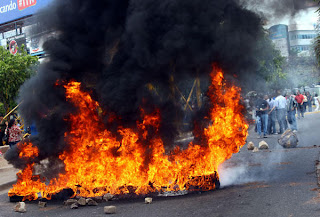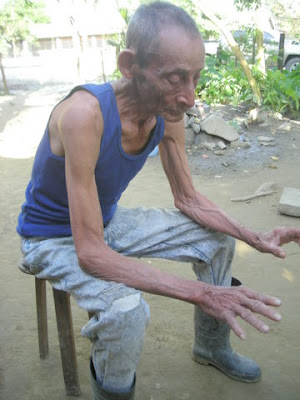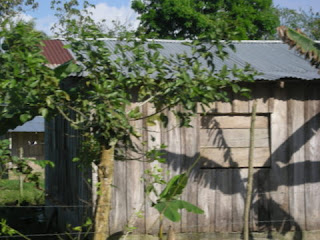Image: Dario Banegas, La Prensa
It is the beginning of the end. Of that I'm sure. I'm just not sure if it is the end of the strikes, the end of the teacher unions, or the end of hope for Honduras to become a developed nation.
Teacher strike declared illegal
Relying on the Labor Code, President Pepe Lobo issued a public statement on Sunday declaring the teacher strike unjustified and illegal. He reiterated his position to dialogue with the unions, but only after teachers go back to the classrooms.
The declaration includes the following sanctions:
a) Teachers who do not return to the classroom on Monday, March 28, will be suspended without salary for two months.
b) Teachers who do not return to the classroom by Wednesday, March 30, will be suspended without salary for six months.
c) Teachers who do not return to the classroom by Monday, April 4, will be suspended without salary for one year.
d) The government will proceed to take administrative measures to fire teachers who do not comply.
The declaration also provides for the temporary suspension and possible dissolution of the teacher unions who have promoted and supported the illegal strike since March 8.
Not explained is how the government will monitor which teachers are in the classroom and which are not, since it is obvious that there is no system in place for that. The government has opened telephone line 104 for the public to report teachers who are not working but an anonymous telephone call will not hold up in labor court.
Leaders play on the ignorance of people
 Labor unions have responded with "What more can they do to us? They kill us, they gas us, they reprimand us, they put us in jail. Teachers will continue in the struggle." Statements like that distort the reality but will play well in the international media and among the "human rights" groups. Jaime Rodríguez, one of the most militant of the teacher union leaders, says that this (the violent protests) is "informal education" for the young people of Honduras and that they need to lose their fear of the "puppets of the oligarchy".
Labor unions have responded with "What more can they do to us? They kill us, they gas us, they reprimand us, they put us in jail. Teachers will continue in the struggle." Statements like that distort the reality but will play well in the international media and among the "human rights" groups. Jaime Rodríguez, one of the most militant of the teacher union leaders, says that this (the violent protests) is "informal education" for the young people of Honduras and that they need to lose their fear of the "puppets of the oligarchy".The protests are becoming increasingly violent with rioters even attacking passing vehicles. The National University in Tegucigalpa was forced to shut down last week due to violent protesters. Óscar Alvarez, Minister of Security, has been given responsible for the safety of children and parents at the schools, while teacher union leader Óscar Recarte has warned parents to keep their children at home due to the danger of unknown teachers and the presence of armed police and military. The noon news showed parents protecting some schools, while at another, some parents were protesting against new teachers. Today's riots, shown in these El Heraldo photos, are primarily confined to Tegucigalpa.
 Additionally, the Resistance Front (FNRP) has written to the UN, OAS, US, European and South American countries to request that the FNRP be recognized as the official representative of the people of Honduras and that these countries and organizations take action to restore democracy in Honduras before more lives are lost. The agitators are hoping that the international community will compare Honduras with what is happening in the Arab countries. What's next? Will they be asking for a no fly zone?
Additionally, the Resistance Front (FNRP) has written to the UN, OAS, US, European and South American countries to request that the FNRP be recognized as the official representative of the people of Honduras and that these countries and organizations take action to restore democracy in Honduras before more lives are lost. The agitators are hoping that the international community will compare Honduras with what is happening in the Arab countries. What's next? Will they be asking for a no fly zone?Political motives behind the strikes
 Lobo says that behind the teacher union protests is a political agenda. He affirmed that people who come to the protests, attacking police and damaging private property with rocks, bats and Molotov cocktails, are not teachers, but rather are agitators paid L.400 to L.1,000 by foreign interests to promote anarchy in the country. Lobo says that the motive is to prevent the reincorporation of Honduras to the OAS, a matter which is to be discussed in the June meeting.
Lobo says that behind the teacher union protests is a political agenda. He affirmed that people who come to the protests, attacking police and damaging private property with rocks, bats and Molotov cocktails, are not teachers, but rather are agitators paid L.400 to L.1,000 by foreign interests to promote anarchy in the country. Lobo says that the motive is to prevent the reincorporation of Honduras to the OAS, a matter which is to be discussed in the June meeting.Mass public protests threatened
The Resistance (FNRP) and various unions have promoted a Grand National Civic Strike on Wednesday, March 30.
Reported proposed changes to the public employee retirement law would raise the voluntary retirement age from 58 to 65 and the mandatory retirement age from 65 to 70. The CGT union leader told members that this reform will result in a 40% decrease in pensions — that alone should be enough to bring thousands to the streets. Public employee unions, including doctors and nurses, have threatened mass strikes which will paralyze the country. On Friday, employees of the National Register of Persons (RNP) and two hospitals struck.
Vilma Morales, President of the National Bank and Insurance Commission, says that there will be dialogue prior to any changes and that the draft is not in Congress yet. She noted that the most important thing is the continued overall security of the retirement system. Morales says that union leaders are being confused by absurd misinformation, like false statements that the retirement age will be raised to 75 and that the 13th and 14th month salaries will be discontinued.
Misinformation flying everywhere
 Television stations and newspapers are benefiting from the quantity of false information (some of which, like Globo TV, they put out themselves), with the government and other organizations buying commercials and taking out full page ads to clarify the situation.
Television stations and newspapers are benefiting from the quantity of false information (some of which, like Globo TV, they put out themselves), with the government and other organizations buying commercials and taking out full page ads to clarify the situation.New minimum wage could light another match
Friday, April 1, is the day that President Lobo has promised to declare the new 2011 minimum wage, because representatives of the labor unions and business sector along with the Minister of Labor were unable to negotiate the new annual increase. Lobo has not divulged whether or not the increase will be retroactive to January 1. The announcement is likely to be met with further strikes.
By law, when the negotiating parties are unable to agree on a new minimum wage, the President is supposed to declare the new wage by January 1 each year. Initially, workers representatives started by demanding a 22% increase while business representatives said that any more than 3.6% would result in the loss of jobs. Unions are now saying the increase can be no less than 7%, the inflation index.
As an aside, last year's minimum wage increase was minuscule despite the large increase in the cost of basic necessities of life. It was not announced until November 2010 and was not retroactive. When unions were naturally upset, Lobo took a dismissive tone and even laughed to reporters, saying something like, "What's the problem? It's only for two months and then there will be a new minimum wage in January (2011)." In some cases, it is easy to understand the unions' anger and frustration with the government and with Pepe Lobo's attitude in particular.
More and more grievances
Other protests have occurred due the high price of basic food items and the ever-increasing price of fuel. As a concession, the government decided not to increase the cost of electricity in April, despite the fact that much of the country's electric supply is generated from fuel, the cost of which has increased significantly in the past few months. Many people in Honduras believe that the president can control the price of fuel by snapping his fingers and have no awareness that the price of gasoline in Honduras is similar to other Central American countries or that the price of food items and fuel have risen worldwide. In 2008-2009, when the worldwide price of a barrel of oil went from approximately US $105 to $65, President Mel Zelaya took credit for the decrease in Honduras fuel prices.
Apologies to all the striking groups who I have failed to mention. There are only so many hours in the day.
Ironic, no?

Printed on government letterhead and websites is the motto of President Lobo's administration, "The government of national unity".















































 Welcome to my Blogicito —
Welcome to my Blogicito — 






